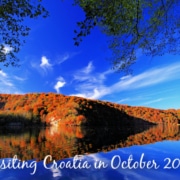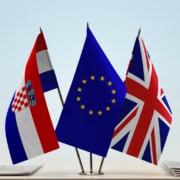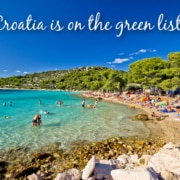Coronavirus Situation in Croatia – Autumn Update
Here we are, already in November 2020 now in 2021, and it seems that the coronavirus pandemic that many hoped would be over or more manageable by summer has certainly reached its second wave – and how. Many countries in Europe and beyond are experiencing huge leaps in daily case numbers and are undergoing new measures, be that lockdowns or more. We wrote up a post in March 2020 about the coronavirus situation in Croatia (as well as advice for Visiting Croatia in Summer 2020, based on covid-related travel restrictions). However, rather than continue to update those older posts, we feel it’s now wiser to write another piece based on the situation in Croatia today. We will continue to update this post regularly.

Coronavirus Situation in Croatia
Latest update Today, 25th February 2021, 544 new cases have been announced. There are presently 2,933 active cases in the country. Most active cases are currently located in Split-Dalmatia county (542 cases), followed by the City of Zagreb (475 cases) and Primorje-Gorski Kotar county (240 active cases). Sadly, there have been 5,489 deaths in total in Croatia. Although there was a downward trend in case numbers until about a week ago, the past few days have seen a bit of a jump again.
Updated Today, 16th February 2021, 274 new cases have been announced. There are presently 1,959 active cases in the country. Most active cases are currently located in Split-Dalmatia county (354 cases), followed by the City of Zagreb (291 cases) and Primorje-Gorski Kotar county (196 active cases). Sadly, there have been 5,357 deaths in total in Croatia.
Updated Today, 9th February 2021, 283 new cases have been announced. There are presently 2,329 active cases in the country. Most active cases are currently located in Split-Dalmatia county (505 cases), followed by the City of Zagreb (307 cases) and Zagreb county (231 active cases). Sadly, there have been 5,224 deaths in total in Croatia.
Updated Today, 25th January 2021, 134 new cases have been announced. There are presently 2,519 active cases in the country. Most active cases are currently located in Split-Dalmatia county (425 cases), followed by the City of Zagreb (338 cases) and Zagreb county (308 active cases). Sadly, there have been 4,859 deaths in total in Croatia.
Updated Today, 8th January 2021, 1,098 new cases have been announced. There are presently 5,794 active cases in the country. Most active cases are currently located in Split-Dalmatia county (862 cases), followed by the City of Zagreb (743 cases) and Zagreb county (672 active cases). Sadly, there have been 4,304 deaths in total in Croatia.
Updated Today, 4th January 2021, 361 new cases have been announced. There are presently 5,899 active cases in the country. Most active cases are currently located in Split-Dalmatia county (922 cases), followed by the City of Zagreb (825 cases) and Primorje-Gorski Kotar county (715 active cases). Sadly, there have been 4,126 deaths in total in Croatia.
Updated Very unfortunately, Croatia suffered its second major earthquake of the year on 29th December 2020. A 6.4 magnitude earthquake struck near the town of Petrinja, about 50km south of Zagreb. A number of foreshocks and aftershocks also took place in the days before and after. Seven people died in this earthquake, and a number of people were also injured. About half of the buildings in Petrinija were destroyed, and the houses and buildings in the local villages were also destroyed or very badly damaged. If you would like to donate money to those affected by the earthquake, please see the information on the Croatian Red Cross website.
Updated On 27th December 2020, Croatia started its covid vaccination programme. The first person to be vaccinated was an 81-year-old care home resident in Zagreb named Branka Anicic.
Updated Today, 18th December 2020, 3,272 new cases have been announced. There are presently 21,297 active cases in the country. Most active cases are currently located in the City of Zagreb (2,965 cases), followed by Split-Dalmatia county (2,392 active cases) and Zagreb county (2,378 active cases). Sadly, there have been 3,023 deaths in total in Croatia.
Updated Today, 15th December 2020, 2,360 new cases have been announced. There are presently 21,861 active cases in the country. Most active cases are currently located in the City of Zagreb (3,092 cases), followed by Split-Dalmatia county (2,441 active cases) and Zagreb county (2,197 active cases). Sadly, there have been 2,778 deaths in total in Croatia.
Updated Today, 11th December 2020, 4,396 new cases have been announced. There are presently 25,006 active cases in the country. Most active cases are currently located in the City of Zagreb (3,657 cases), followed by Split-Dalmatia county (2,638 active cases) and Primorje-Gorski Kotar county (2,321 active cases). Sadly, there have been 2,484 deaths in total in Croatia.
Updated Today, 8th December 2020, 2,613 new cases have been announced. There are presently 21,685 active cases in the country. Most active cases are currently located in the City of Zagreb (3,408 cases), followed by Split-Dalmatia county (2,632 active cases) and Primorje-Gorski Kotar county (1,970 active cases). Sadly there have been 2,298 deaths in total in Croatia.
Updated Today, 2nd December 2020, 3,539 new cases have been announced. There are presently 22,610 active cases in the country. Most active cases are currently located in the City of Zagreb (3,119 cases), followed by Split-Dalmatia county (2,759 active cases) and Varazdin county (1,750 active cases). Sadly there have been 1,916 deaths in total in Croatia.
Updated Today, 27th November 2020, 4,080 new cases have been announced – another new record. (Beating the previous day’s record of 4,009 new cases.) There are presently 22,408 active cases in the country. Most active cases are currently located in the City of Zagreb (3,799 cases), followed by Split-Dalmatia county (2,652 active cases) and Varazdin county (1,795 active cases). Sadly there have been 1,600 deaths in total in Croatia.
Updated Today, 24th November 2020, 1,973 new cases have been announced. There are presently 19,275 active cases in the country. Most active cases are currently located in the City of Zagreb (3,775 cases), followed by Split-Dalmatia county (2,088 active cases) and Varazdin county (1,605 active cases). Sadly there have been 1,398 deaths in total in Croatia.
Updated Today, 20th November 2020, 2,958 new cases have been announced. There are presently 18,193 active cases in the country. Most active cases are currently located in the City of Zagreb (3,481 cases), followed by Split-Dalmatia county (2,155 active cases) and Varazdin county (1,567 active cases). Sadly there have been 1,257 deaths in total in Croatia.
Updated Today, 16th November 2020, 1,313 new cases have been announced. There are presently 15,699 active cases in the country. Most active cases are currently located in the City of Zagreb (3,098 cases), followed by Split-Dalmatia county (1,765 active cases) and Varazdin county (1,498 active cases). Sadly there have been 1,082 deaths in total in Croatia.
Updated Today, 10th November 2020, 1,467 new cases have been announced. There are presently 14,524 active cases in the country. Most active cases are currently located in the City of Zagreb (3,021 cases), followed by Split-Dalmatia county (1,520 active cases) and Varazdin county (1,428 active cases). Sadly there have been 865 deaths in total in Croatia.
Updated The last few weeks (from mid-October onwards) in Croatia have seen huge jumps in daily new case numbers, with records on case numbers being frequently broken. It is not uncommon for there to be more than 2,500 new cases announced in any one day. In fact, today, 6th November 2020, 2,890 new cases have been announced – a record. (Beating the previous day’s record.) That means that there are presently 15,567 active cases in the country. Most active cases are currently located in the City of Zagreb (3,594 cases), followed by Split-Dalmatia county (1,888 active cases) and Varazdin county (1,232 active cases). Sadly there have been 717 deaths in total in Croatia.
Where to find the latest news and data
All stats related to cases can be found on the Koronavirus.hr website (in English); the map on that site shows active cases by county. The CroatiaCovidInfo website also shows active cases per 100,000 by region and maps out hotspots (or not).
Another useful website to check is the is the European Centre for Disease Prevention and Control (ECDC) website. This shows 14-day cumulative number of cases per 100,000 for all EU countries.
Coronavirus Regulations in Croatia
The main regulations you must adhere to in Croatia are:
- Face masks must be worn in all indoor spaces, including catering establishments (cafes, restaurants etc), except when you are seated
- Face masks must be worn outdoors in situations where social distancing cannot be maintained (and it is recommended that face masks be worn anyway in outdoor situations)
- You must wear face masks in commercial indoor spaces e.g. shops
- You must wear face masks on all forms of public transport (buses, ferries, catamarans, trains, trams, taxis)
If you are an EU/EEA citizen, you are allowed to enter and visit Croatia without restriction BUT updated you must present proof of a negative covid PCR test not older than 48 hours unless you are travelling from a green region/country (as shown on the ECDC Map). For others, you must have a specific reason for visiting Croatia (and touristic is considered to be a valid reason – but you must be able to show proof of paid accommodation) as well as showing proof of a negative covid PCR test that is not older than 48 hours at the point of entry. All regulations regarding entry into Croatia can be found on the Ministry of the Interior website.
Other regulations
Other regulations that are currently required in Croatia (although these may not affect all visitors to the country) include:
Newest update As of 1st March 2021, outdoor terraces of catering facilities (cafes, restaurants) are permitted to reopen to serve customers. These establishments can operate from 6am to 10pm each day, with a 3m gap between tables and 1.5m between chairs. Patrons can only go inside (wearing a mask) to go to the toilet.
Updated As of 15th February 2021, some restrictions in Croatia have been lifted. Cafes are able to sell food and drinks to go, although outdoor terraces remain closed and patrons must not congregate and consume their purchases outside venues. Gyms and fitness centres are allowed to reopen (with strict epidemiological measures in place). Casinos (and similar) are allowed to reopen although can only do so until 10pm each day. Children’s playrooms have been allowed to reopen. These are all in force until 28th February.
Updated Covid regulations in Croatia as mentioned below (e.g. the closure of cafes and restaurants, restrictions of numbers of people gathering together, reduced shop opening hours and so on) have been extended until 31st January 2021.
Updated As of 22nd December 2020 (until 8th January 2021), travel between Croatian counties will be severely restricted. Travel can only be undertaken by obtaining a special pass. Movement will be allowed (without a pass) between the City of Zagreb and Zagreb County (considered one ‘county’ for this purpose).
Updated There are additional regulations that shops must adhere to, which come into effect from 12th December 2020. These regulations place restrictions on the number of people that can be in a shop at any one time – for example, shops up to 10 sq. m. in size can only have one customer in at a time; shops of 11 to 100 sq. m. in size must provide 10 sq. m. for every customer. These regulations are in place until 10th January 2021.
Updated Anyone found not wearing a mask where it is compulsory may be fined 500 Kunas.
Updated As of 30th November 2020, everyone entering Croatia must produce proof of a negative covid PCR test that has been undertaken in the previous 48 hours. This includes Croatian citizens. The only exceptions are anyone travelling from a green region/country from within the EU/the Schengen Zone. (Regardless of your citizenship.) As of writing today, there are no green zones – you can see where there may be any green zones on this ECDC Map. If you cannot present proof of a negative covid PCR test at the point of entry, you will be able to obtain a PCR test in Croatia and must self-isolate until you receive a negative result. You can find more details of this on the Croatian Tourist Board website and the Ministry of the Interior website.
Updated Further new restrictions are as follows:
- Restaurants and cafes must close although restaurants can offer delivery 24 hours a day
- Sale of alcohol continues to be banned between the hours of 10pm and 6am
- Hotel restaurants can remain open only to serve hotel guests
- Wedding ceremonies cannot take place
- Public gatherings are limited to a maximum of 25 people
- Public transport – including inter-city transport – must limit passengers to 40% of capacity
- Increased supervision of shops to ensure the number of customers on the premises is in line with regulations
- Gyms are allowed to operate but must provide 10 sq. m. per customer
- Cinemas, theatres, museums and galleries are allowed to remain open, with limits to visitor numbers per sq. m.
Updated as of 22/11/20 The below regulations have been further updated, the additional restrictions now include:
- Nightclubs, night bars, casinos and similar are not permitted to open
- A maximum of 15 people can attend weddings
- A maximum of 25 people can attend funerals
- A maximum of 10 people can attend other private ceremonies
- Alcohol cannot be sold between the hours of 10pm and 6am
- Shops and catering facilities that are permitted to open must clearly display the maximum number of people that can be in the premises at any one time
- Shops must take on additional measures at expected busy times (holidays) to ensure more customers do not stay in the premises at the same time
Previous restrictions:
- Alcohol is not allowed to be sold between the hours of midnight and 6am
- Sports events cannot have any spectators
- Public events or gatherings with more than 50 people are banned
- A maximum of 30 people can attend weddings
- A maximum of 30 people can attend funerals
- A maximum of 15 people can attend other private ceremonies
Coronavirus Testing in Croatia
Should you be in Croatia and need to take a covid test, you can find a list of testing centres on the Koronavirus website. That page also details how to book a test at these centres.
Updated You can now also see a map of testing centres (including others not listed on the site above) at koronatestiranje.com/en. This map also details which centres can be booked in advance (and how to do so) as well as prices.










